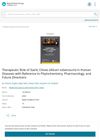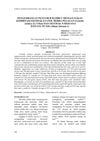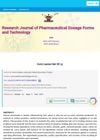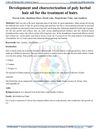61 citations,
January 2007 in “Indian Journal of Dermatology Venereology and Leprology” Garlic gel with betamethasone cream significantly improves hair regrowth in alopecia areata.
7 citations,
December 2021 in “Pharmaceutics” The nanoemulsion with garlic oil, apple cider vinegar, and minoxidil could effectively treat alopecia areata.
 1 citations,
January 2022 in “Journal of Drug Delivery Science and Technology”
1 citations,
January 2022 in “Journal of Drug Delivery Science and Technology” A gel made with finasteride, garlic oil, and Aloe vera using nanotechnology can potentially treat hair loss more effectively.
 November 2024 in “Apple Academic Press eBooks”
November 2024 in “Apple Academic Press eBooks” Garlic chives have many health benefits and potential for drug development.

Garlic can help hair grow by activating certain growth pathways, and it works whether you eat it or apply it to your scalp.
 13 citations,
January 2015 in “Evidence-based Complementary and Alternative Medicine”
13 citations,
January 2015 in “Evidence-based Complementary and Alternative Medicine” Garlic chive extract helped mice grow more hair by increasing a specific growth factor.
 3 citations,
May 2016 in “International Journal of Research in Ayurveda and Pharmacy”
3 citations,
May 2016 in “International Journal of Research in Ayurveda and Pharmacy” Ayurveda, using herbs like ginger, garlic, and turmeric, can reduce chemo-radiotherapy side effects in cancer patients.
March 2022 in “Proceeding Of Sari Mulia University Midwifery National Seminars” Garlic may help reduce side effects of breast cancer treatments.
 December 2021 in “Jurnal ilmiah Manuntung”
December 2021 in “Jurnal ilmiah Manuntung” The best hair growth results were achieved with a hair tonic containing 5% gotu kola extract and 0.04% garlic extract.
January 2018 in “Journal of Food Biosciences and Technology” Garlic and fenugreek may help treat hair loss.
 December 2024 in “International Journal of Drug Delivery Technology”
December 2024 in “International Journal of Drug Delivery Technology” A gel with dutasteride and 10% garlic extract may effectively treat male pattern baldness.

Some TikTok hair loss remedies like rosemary oil, onion juice, and garlic gel show promise, but more research is needed and they might delay proper treatment.
 May 2023 in “Journal of Ethnopharmacology”
May 2023 in “Journal of Ethnopharmacology” The wild garlic plant, Allium macrostemon Bunge, can promote hair growth and could potentially be used to treat hair loss.
67 citations,
July 2011 in “Clinical, cosmetic and investigational dermatology” The document suggests a personalized treatment plan for alopecia areata based on the patient's age and hair loss severity, using a range of therapies ranked by effectiveness and safety.
 40 citations,
August 2018 in “Skin appendage disorders”
40 citations,
August 2018 in “Skin appendage disorders” Some alternative treatments for hair loss might work, but more research is needed.
 25 citations,
May 2009 in “International Journal of Dermatology”
25 citations,
May 2009 in “International Journal of Dermatology” About one-third of dermatology patients in Ankara, Turkey use unconventional treatments for skin issues.
 24 citations,
January 2020 in “International Journal of Molecular Sciences”
24 citations,
January 2020 in “International Journal of Molecular Sciences” Some plants with flavonoids may help treat hair loss and promote hair growth.
15 citations,
December 2009 in “American journal of clinical dermatology” The effectiveness of alternative treatments for alopecia areata is uncertain and needs more research.
 14 citations,
October 2020 in “Natural Products and Bioprospecting”
14 citations,
October 2020 in “Natural Products and Bioprospecting” Various treatments, including FDA-approved drugs, natural products, and oral supplements, can help with hair loss, but a patient's medical history and potential allergies should be considered when choosing a treatment.
 10 citations,
May 2018 in “Nutrition and Cancer”
10 citations,
May 2018 in “Nutrition and Cancer” Certain spices may help prevent and treat skin cancer, but more human trials are needed.
 9 citations,
March 2011 in “Oxidative stress and disease”
9 citations,
March 2011 in “Oxidative stress and disease” Some herbal treatments are effective for skin disorders, but more research and regulation are needed.
7 citations,
January 2018 in “Asian journal of pharmaceutical research” The polyherbal hair oil effectively treats various hair problems.
 3 citations,
February 2024 in “International Journal of Pharmaceutical Sciences Review and Research”
3 citations,
February 2024 in “International Journal of Pharmaceutical Sciences Review and Research” Herbal hair oil with natural ingredients promotes healthy hair and addresses common hair issues.
 3 citations,
July 2021 in “International journal of pharmaceutical chemistry and analysis”
3 citations,
July 2021 in “International journal of pharmaceutical chemistry and analysis” Medicinal plants like Aloe, Amla, and Coconut oil help with hair and skin care.
 3 citations,
August 2020 in “PubMed”
3 citations,
August 2020 in “PubMed” Some natural ingredients like onion juice, rosemary oil, and pumpkin seed oil may help with hair growth and reducing hair loss.
 1 citations,
October 2023 in “Indian dermatology online journal”
1 citations,
October 2023 in “Indian dermatology online journal” Many people use home remedies for skin conditions, but there's limited scientific evidence to support their effectiveness.
 1 citations,
May 2017 in “InTech eBooks”
1 citations,
May 2017 in “InTech eBooks” Some natural remedies may help with hair regrowth, but more research is needed to confirm their effectiveness and safety.
 December 2024 in “Research Journal of Pharmaceutical Dosage Forms and Technology”
December 2024 in “Research Journal of Pharmaceutical Dosage Forms and Technology” The hair oil may effectively treat common hair problems with fewer side effects.
 February 2024 in “International journal of biology, pharmacy and allied sciences”
February 2024 in “International journal of biology, pharmacy and allied sciences” Plant-based treatments can effectively and safely treat hair loss.
 May 2021 in “Journal of emerging technologies and innovative research”
May 2021 in “Journal of emerging technologies and innovative research” The polyherbal hair oil effectively treats hair problems with fewer side effects.






















